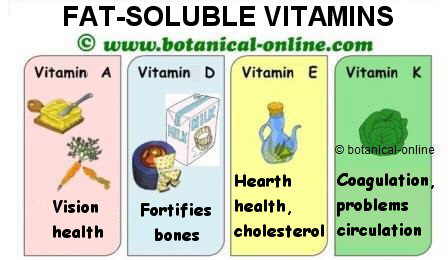Contents
Classes of vitamins that are fat-soluble
What are fat-soluble vitamins?
Fat-soluble vitamins are a type of vitamins that are dissolved in fats.
These vitamins are essential components in our diet that the body needs to function properly.
Sources of fat-soluble vitamins
Fat is found and therefore, in foods rich in fats such as oil, avocado, butter, whole milk (cream, cheese, etc.) or eggs (especially in the egg yolk).
List of liposoluble vitamins

Main properties of fat-soluble vitamins
Toxicity and dangers of fat-soluble vitamins
Unlike water-soluble vitamins, these types of vitamins can not be eliminated in the urine.
Therefore, if you eat an excess of vitamins liposolibles there is a risk that they accumulate in the body to reach toxic doses. In general, these doses are assumed when taking vitamin supplements without medical supervision.
We must be extremely cautious with liposoluble vitamins (A, D, E and K), since these are stored in the body and their excess is not eliminated as the previous ones.
- Vitamin A, when ingested in the form of beta-carotene in food, is not toxic.
But if it is ingested through the supplements, the very high and prolonged doses (25,000 IU) can be toxic, producing hypervitaminosis, which manifests itself in the form of muscle weakness, blurred vision, hair loss, poor condition of the skin, diarrhea, nausea, cirrhosis, weight loss, fatigue … etc. Vitamin A supplements should not be given to pregnant women to prevent abnormalities in the fetus.
- Vitamin D, which is obtained from sun exposure, is eliminated without problems. But in the form of supplements, doses higher than 1000 – 1200 IU, taken during half a year can cause gastrointestinal problems, headache, lack of appetite, fatigue, arrhythmia, bone decalcification and calcium accumulation in muscle tissue.
- Vitamin E has very little toxicity. However, there are a number of circumstances that require us to take precautions:
You can not take supplements of this vitamin for people with hemophilia.
Caution should be exercised in the administration of this vitamin in patients who take anticoagulant medications and avoid these supplements one month before surgery.
High doses of vitamin E prevent vitamin A from being absorbed correctly. Pregnant or lactating women should not exceed the RDA.
- Vitamin K, taken through vitamin supplements, in very high doses, can produce increased sweating and redness. Potentiates the power of anticoagulants, increasing the possibility of hemorrhage.
![]() More information on vitamins
More information on vitamins








